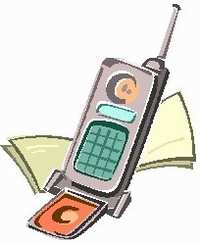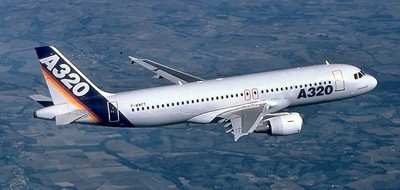Last Available Phone-Free Refuge Threatened
 Airbus announced this week it
received airworthiness certification for a cell-phone system
onboard its aircraft. On Monday, the European Aviation Safety
Agency (EASA) approved Airbus' GSM on-board system, for cell phone
and Blackberry device use while flying.
Airbus announced this week it
received airworthiness certification for a cell-phone system
onboard its aircraft. On Monday, the European Aviation Safety
Agency (EASA) approved Airbus' GSM on-board system, for cell phone
and Blackberry device use while flying.
With this approval, Airbus has taken a major step towards
airline operation of the OnAir service that will enable passengers
to use their BlackBerry-type devices and cell phones during flights
in Europe. Passengers will be able to make and receive calls as
well as send and receive emails and text messages while flying at
altitudes above 9,840 feet.
Cabin crew can easily manage the service and will have the
option of selecting a "voice-off" mode which only allows SMS text
messaging and email services, according to the company.
"This certification is Airbus' first response to the growing
market demand for on-board connectivity, "said Rainer von Borstel,
Airbus Senior Vice President, Cabin & Cargo Customization. "It
paves the way for the subsequent worldwide deployment of cell phone
services and internet based services across all Airbus aircraft
types."
OnAir, a joint venture between Airbus and SITA, will act as the
service provider for a range of connectivity services. Initially
the service will be available on Airbus' Single Aisle Family for
short-haul flights in Western Europe, probably the Airbus A318
operated by Air France.
Graham Lake, chief commercial officer of OnAir, told the
International Herald-Tribune British airline BMI, Portuguese
airline TAP and budget airline Ryanair have also signed up to offer
the services.
"We are absolutely delighted by this news," he said. "Passengers
will soon be able to use their own phones while in a flying
aircraft."
There is a bit of a downside, though: the mother of all roaming
charges.
According to Lake, the expected cost will be around $2.50 per
minute for calls and 50 cents per SMS message. OnAir does not set
pricing.
"Instead of roaming in a country, you are effectively roaming in
the sky," Lake said. "We send your call via satellite down to the
GSM network."
Don't look for a price list during your flight, however.
"Similar to international roaming, it is perhaps never totally
clear what the consumer's end price will be until the bill
arrives," Lake said. "Passengers calling the same phone number from
the same flight could pay very different amounts, depending on the
contract they have with the cell phone service provider."
 Cabin crews will have control
over the OnAir system and can limit usage to incoming calls or text
messages only, as they see fit.
Cabin crews will have control
over the OnAir system and can limit usage to incoming calls or text
messages only, as they see fit.
"The system is designed for cabin crew to act when there is
inappropriate behavior on board," Lake said. "Most airlines will
probably shut off the incoming calls during overnight long haul
flights."
But, what about an air travel being the last telephone-free
sanctuary?
"We are certain that a cultural etiquette will
develop on airlines as our system goes into operation," Lake said.
"The underlying principle that airlines should adopt is encouraging
respectful behavior."
There may be a few skirmishes, he added, because of the
multicultural nature of commercial air travel.
"While some Mediterranean cultures find it polite to put your
phone on the table during a meeting and answer when it rings, this
is not done in the U.K.," Lake said. "The challenge inherent in
aircraft is that they are by definition a place where cultures
mix."
For those of us who prefer laptop computer use, Lake said the
system would offer high-speed WiFi throughout the aircraft.
Lake said one of the hardest changes to make will be that of
airline staff and the fear that using such communication devices is
unsafe.
"The use of mobile phones is more a cultural than a safety
issue," Lake said. "In some countries that are very opposed to the
use of mobile phones in flight, I think we will have trouble
changing the habits of airline crew."
OnAir determined through studies 10 to 25 percent of passengers
and crew leave communication devices turned on despite instructions
and warnings to the contrary. Cell phones will only put out one
milliwatt of signal strength when searching for a network on the
OnAir system, compared to one full watt otherwise.
"If mobile telephones were unsafe on aircraft, we would have
already had many incidents," he said. "Just listen to all the beeps
of people receiving SMS messages as any aircraft approaches
landing."
The system's only restriction is use only above 9,840 feet and
that is only because of cell phone service providers' concern about
disruptions that could be caused from a single cell phone's attempt
to connect to several land-based cell towers.
Isn't Airbus concerned about its success probability? After all,
Boeing was recently forced to shut down its attempt to offer such a
service, Connexion, due to lack of profit as well as passenger
interest, the company said.

Lake said the OnAir system has fundamental differences and a
highly sustainable business model.
"The Connexion system had to lease transponders whether they
used them or not," Lake said. "Among other differences, we pay for
what we use."
US regulators continue to ban cell phone use aboard planes
because of potential interference with the aircraft's
electronics.
 ANN's Daily Aero-Linx (04.16.24)
ANN's Daily Aero-Linx (04.16.24) Aero-News: Quote of the Day (04.16.24)
Aero-News: Quote of the Day (04.16.24) Airborne 04.10.24: SnF24!, A50 Heritage Reveal, HeliCycle!, Montaer MC-01
Airborne 04.10.24: SnF24!, A50 Heritage Reveal, HeliCycle!, Montaer MC-01 Airborne 04.12.24: SnF24!, G100UL Is Here, Holy Micro, Plane Tags
Airborne 04.12.24: SnF24!, G100UL Is Here, Holy Micro, Plane Tags Airborne-Flight Training 04.17.24: Feds Need Controllers, Spirit Delay, Redbird
Airborne-Flight Training 04.17.24: Feds Need Controllers, Spirit Delay, Redbird





